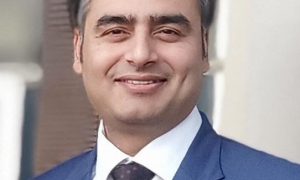This interview has been published by Prabhjot Singh, Priyanka Karwa and The SuperLawyer Team
***Disclaimer***
The opinions and views expressed are that of the author and Optum, United Health Group bears no responsibility whatsoever. The thoughts shared are for general informational purposes and should not be construed as any official advisory.

Why did you choose law as a career, was it planned or all of a sudden you decided to be a lawyer?
I was a science student, who was coaching herself to be a doctor honestly, so I didn’t really know if law was something I would want to pursue.
It was definitely not a planned decision to begin with. It was at the middle of my 12th grade, when my fellow students started discussing about courtroom dramas and how they are being inclined towards pursuing law, I started reading and exploring the opportunities in legal field.
On a lighter note, it wouldn’t be wrong to even admit that I became attracted to courtroom dramas and the more glamorized view of law.
I started to then consider more seriously what I wanted the most in my career and think I wanted professional stability and financial security. I was also keen to follow a career path that allows me to leverage my communication skills and offers an avenue for continious learning and keeping myself updated with the latest in a field.
At the time it felt that the law provides both, so I imagined it would be an ideal career for me.
Then the more I read about it, I started to understand that being such a fascinating field it would offer nuanced challenges to resolve while demanding a variety of skills and this piqued my interest in the field law.
What were the challenges that you faced in the beginning of your career?
Learning about law in classrooms compared to real life application in time bound scenarios was the first challenge that I faced.
There were many days that I had to go back to refer to my internship days or leverage experience of my batch mates/seniors to draft an appropriate clause or provide the most effective advice. Initial days required a lot more hours being spent making the transition from academics to a law associate all the more challenging.

Apart from this, settling in a big city like Bombay was also a real challenge. Coming from a small town and then being in law schools’ protected environment, it was only now that I had to “go figure” for everything from renting a house, setting it up, making transport arrangements, at the same time putting the extra work in the first few months of your career. The trouble is, no one teaches you this part!
Mugdha, do you think that for a first-generation lawyer, the journey becomes a little difficult? Please explain the same wrt to your own experience.
Stepping into law school was a new world, where people who had families with multiple generations of lawyers talked fluently about topics I was making hard efforts to understand myself and that made me feel I had more catching up to do. I had to assess all opportunities independently with my own lens and learn concepts from scratch that some had been exposed to from childhood.
Looking back I feel now that the extra effort I had put in also created the appreciation that I hold for the field of law.
Being able to build an experience in M & A and VC deals, what according to you are the most important skills to have?
Within my limited experience of M&A and VC deals, I believe one of the most important skill is to see the bigger picture. You need to be able to get your head out of the documents to see that you are working the whole process from scratch to end and therefore must be able to build your opinion on the end goal and the manner in which you’d assist your client to achieve it.
This requires strong business awareness and equally strong legal and commercial understanding of the transaction.This in no sense should take away from the importance of paying attention to detail as the devil is always in those details!
Apart from this I believe, building a good relationship with both your client and also opposing counsels, help you navigate the negotiations better and sometimes even builds your own power of persuasion. While this may not be practical all the time, trying never hurts.
As someone who got a chance to work with big companies, was it a smooth sail for you?
I don’t think it was all rosy by any means. It did take some time and effort and a lot of of unlearning for ultimately learning some more. I worked towards moving from a law firm mindset and started to imbibe an in-house midset.
The in-house mindset I speak of is much more closer to business, stakeholder requirements and is also customer driven. In the beginning one of the challenges that I personally faced was balancing expectations as an in-house counsel, keeping the business needs ahead of the legal structures and nuances, yet being within the scope of law.
I’d say, I am still a work in progress.
India is witnessing amazing growth because of the startups, according to you Mugdha, what are the roles and responsibilities of a lawyer in dealing with start-ups?
In my opinion, you need to be more of a generalist in the real sense of the word. As a startup lawyer you must know a bit of everything as you advise startups throughout their lifecycle on a variety of issues, while all along living the risks and uncertainties associated with startups. This begins with setting up of their venture and related legal & regulatory compliance, which then moves to routine advisory for general corporate or commercial transactions undertaken on a regular basis.
The role of the startup lawyer doesn’t end here as now they will also assist the startups for raising capital from angels and VCs and help the startups sail through legal and business issues arising as it scales and grows its businesses.
Finally, also taking the full circle and reaching the finishing line is the most toughest, but perhaps also one of the more satisfying tasks of a startup lawyer who has seen the emergence and growth of the startup and is now able to help them sell the business or take the company public in an IPO.
Creating a work-life balance and focusing on mental health has been a challenge lately in this industry, but you manage it well, please tell our audience how?
I think I am far from managing it well, but I am now at a place where I constantly aim to strike that balance between work and personal life and try and give time to a lot of my dreams beyond just the law and my professional commitments. I now understand when to pause and enjoy life and when to get back to the rigorous work routine.
I am comfortable assessing how much work is too much work and to take a step back (including mentally), when needed.
I enjoy creating content when I get some time while I am travelling or just some happy stuff on Instagram. I unapologetically think that it is okay and so I am active on social media because I enjoy it.
While I understand, to some social media is trivial or toxic and to an extent it maybe is, but I think it is also a great tool to voice your opinion, teach, learn or for just any form of expression and I believe a part of my ‘work-life balance’ comes from being able to show who I am or where my heads at by simply expressing it. It is a very personal view though and to each their own!
For this I believe one sincerely has to put in efforts to create this space and the right kind of work place often accelerates that effort.
Apart from expression on social media platform, I love experimenting with food, both to cook and eat. I travel across continents just to experience the culture and I believe a part of that culture is their food. Once am back, for weeks I try to recreate food that I eat on my escapades and I enjoy reliving my travel stories through this.

I love to travel as it adds perspective to life and keeps me grounded too knowing that theres a huge World out there with variety of people and culture and we, as an individual, are such a small part of this whole story and there is so much to learn and know.
They say nowadays a lawyer must have that business acumen, do you believe this as well? If yes, briefly describe our audience about it.
Yes, definitely. The journey becomes smoother once you are able to amalgamate your legal knowledge with business acumen and are able to communicate effectively and efficiently with your stakeholders.
A lot of decision making is done by weighing and analyzing differentiated opinions and often conflicting priorities, that may even sometime require you to say “No”. As in-house counsel, one should learn to strike that balance.
In the rapidly growing and dynamic world, it becomes important to anticipate and understand how various factors such as geopolotical scenarios, changing landscapes of policies and increased focus on risk mitigation will impact both businesses and laws.
Lastly, few tips for our young law professionals?
For the young law professionals I have just a few tips from my own experiences and that is ;
‘Use this time to understand where you want to be in next 10 and 20 years of your career and start making those career choices early on, if possible’
These are the days of maximum learning but also maximum hardwork so put in that extra effort and it will take you a long way.
Having said that, don’t lose the sense of self and try and understand your own boundaries, that can help you create space for self-awareness and mental stability.
Get in touch with Mugdha Sharma-























